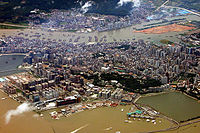Gaming revenues at Macau casinos dropped in June, the first monthly fall in five years as punters switched their focus from baccarat tables to the Brazil World Cup.

Gross revenues from “games of fortune” in the former Portuguese colony sank 3.7 per cent last month from a year earlier, compared with a 9.3 per cent rise in May. The monthly revenue figure had not contracted since 2009.
Macau is the world’s biggest gambling centre and the only part of China where casinos are legal. In the year to date, gambling revenues have reached $24bn, a 12.6 per cent increase on the same period in 2013. Last year, Macau turned over gaming revenues seven times that of Las Vegas.
Analysts attributed the fall to a range of factors, including the start of the football World Cup on June 12, which has drawn attention away from gaming tables, and a recent ban on smoking on casino floors.
Aaron Fischer, analyst at CLSA, said that the World Cup and the slowdown in the Chinese economy were the main factors crimping overall revenue, while a switch from high-roller VIPs towards mass market gamers had hit headline growth.
Authorities have also taken steps to stop gamers using debit and credit cards to circumvent China’s controls on bringing money out of mainland China. Gamblers have often used such cards to buy goods –usually watches or jewellery – in Macau, that are immediately returned in exchange for cash to be used for betting.
Though not illegal, this practice enables gamers to skirt rules that limit the amount of money that can be taken out of China by an individual each day to Rmb20,000 ($3,210).
Under new rules that came into force this month, pawnshops and jewellery stores operating on casino floors are no longer able to add extra card terminals that take payments through UnionPay – China’s main credit card company. UnionPay said in May that it too was taking steps to tackle illegal financial transactions in Macau.
Despite the fall in June, most analysts remain optimistic about the outlook for the casino sector. Phoebe Tse, analyst at Barclays, was among those to predict weaker revenues in June, but said the negative headlines from the UnionPay issue were “noise.”
“We expect the smoking ban to have a limited impact; the World Cup impact will also be transient,” Ms Tse wrote in a note to clients on June 30. “We expect growing penetration supported by new casino openings and infrastructure improvements to drive long-term growth.”

